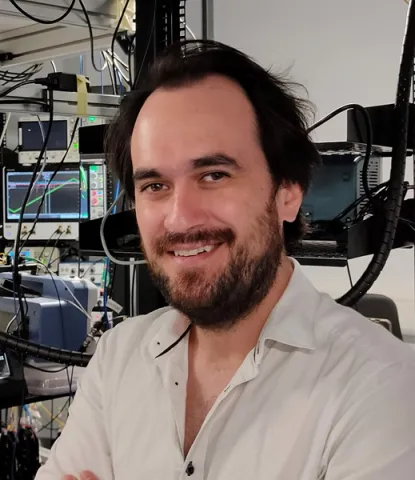About the project
The future Quantum Internet requires efficient devices that store and recall arbitrary quantum states of light. These devices, known as quantum memories, can synchronise entanglement operations between distant locations. This project focuses on the development of alkali-atom-based quantum memories and interfacing them with semiconductor quantum dot single photon sources.
Realising future quantum-enhanced technologies such as quantum computers and the quantum internet will require developing scalable quantum memories for light. Alkali atoms in the hot vapour phase offer a low-cost platform for efficient light-matter interactions that can be implemented at the industrial scale (e.g. UK-based quantum company ORCA computing). Quantum dot technology has recently emerged as a world leader of single photon delivery with a strong presence in quantum industry (e.g. UK-based quantum company Aegiq).
In this project, you'll develop and build next-generation rubidium-based quantum memories and interface them with semiconductor quantum dot single photon sources. You'll gain hands-on experience building atomic experimental setups, characterising their performance, and addressing outstanding issues associated with storage time and efficiency.
You'll also gain experience with semiconductor quantum dots, operating them in cryogenically cooled environments, with opportunities to engage with the state-of-the-art cleanroom facilities to enable full control of the quantum dot devices. You will interconnect these hybrid devices to demonstrate local quantum networking protocols, with scope to interface these devices with deployed optical fibre networks. paving the way for building global quantum networks.
You'll have the flexibility to follow your particular interests and determine your own direction of travel. There will be opportunities to engage with industrial partners and collaborators in the UK and abroad.
The School of Optoelectronics (ORC) is committed to promoting equality, diversity inclusivity as demonstrated by our Athena SWAN award. We welcome all applicants regardless of their gender, ethnicity, disability, sexual orientation or age, and will give full consideration to applicants seeking flexible working patterns and those who have taken a career break.
The University has a generous maternity policy, onsite childcare facilities, and offers a range of benefits to help ensure employees’ well-being and work-life balance. The University of Southampton is committed to sustainability and has been awarded the Platinum EcoAward.
